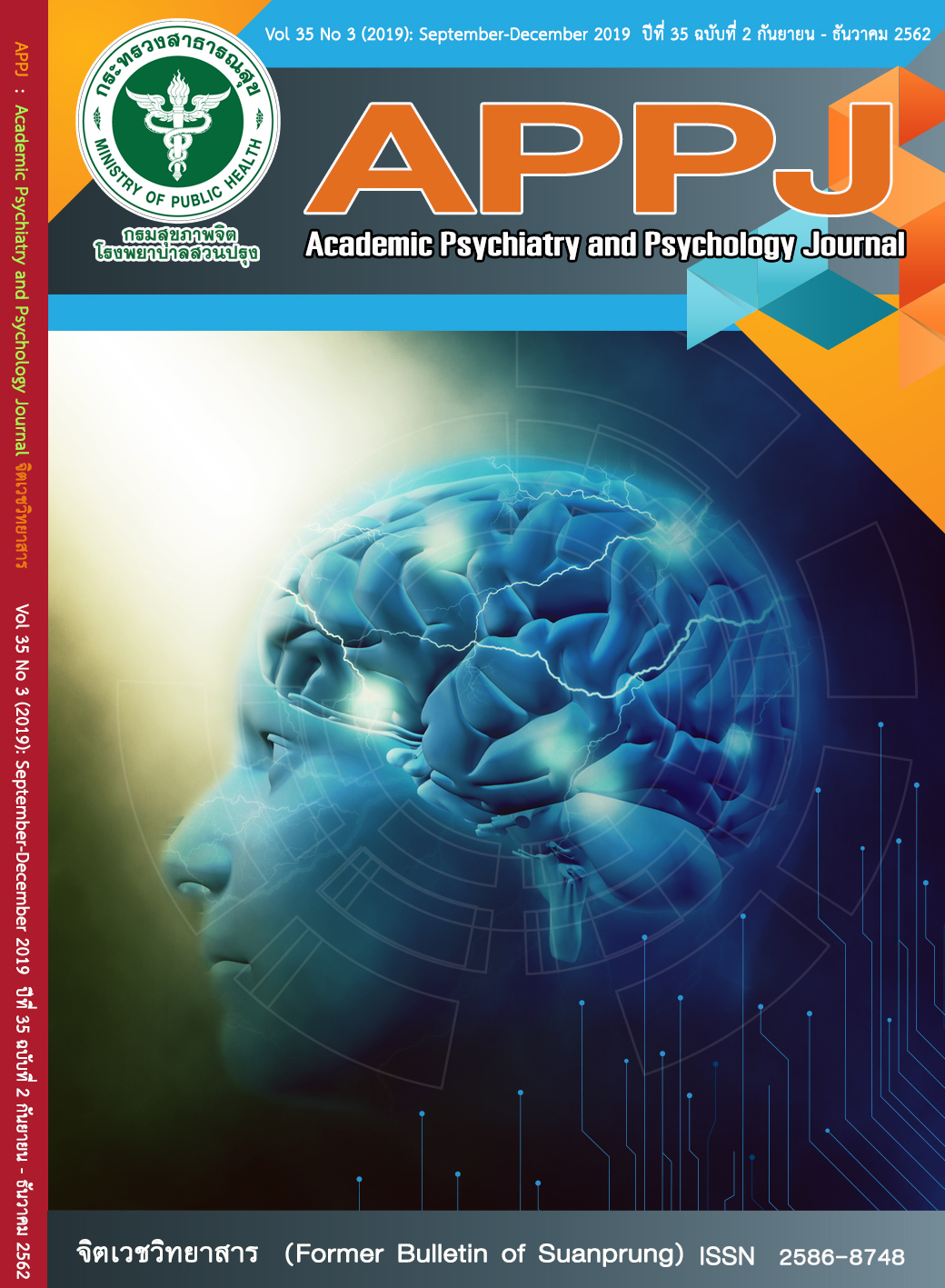Drinking Refusal Self-Efficacy Among Child and Adolescents
Main Article Content
Abstract
Objective: To explore the drinking refusal self-efficacy among children and adolescents
Materials and Method: This was a descriptive study. Six hundred and sixty-six children and adolescents studying in a municipal school in the upper northern region of Thailand were selected by using multistage random sampling. Data were collected from January to February of 2019. The Drinking Refusal Self-Efficacy Questionnaires – Shortened Adolescent Version: was used. Data analysis employed descriptive statistics.
Results: Samples were 311 boys and 305 girls (50.5% and 49.5%). Numbers in each educational level were 172 in elementary level (grade 4-6), 252 in junior high school (grade 1-3), and 192 senior high school (grade 4-6) (28%, 40.9%, and 31.1% respectively). Three hundred and sixty-six students reported high scores of drinking refusal self-efficacy, while 250 reported low scores (59.4 % and 40.6%). According to the educational level, senior high school (grade 4-6) students were reported to have the highest number of low scores, then junior high school (grade 1-3) students and elementary level (grade 4-6) students, respectively (41.7%, 38.1%, and 36.0%). Regarding the low scores in each dimension, the emotional relief refusal efficacy dimension was reported the highest, then the social pressure refusal efficacy dimension, and the opportunistic refusal efficacy dimension, respectively (43.2%, 40.6%, and 27.1%).
Conclusion: Almost halves of the sample groups in this study presented low scores of drinking refusal self-efficacy.
Article Details
บทความหลังผ่านการปรับแก้จากกองบรรณาธิการแล้ว เป็นลิขสิทธ์ของวารสารจิตเวชวิทยาสาร โรงพยาบาลสวนปรุง กรมสุขภาพจิต กระทรวงสาธารณสุข ห้ามเผยแพร่เพื่อประโยชน์ทางการค้าโดยไม่ได้รับอนุญาต แต่อนุญาตให้เผยแพร่บทความดังกล่าวเพื่อประโยชน์ทางการศึกษาแก่ประชาชนทั่วไป ทั้งนี้กองบรรณาธิการไม่จำเป็นต้องเห็นด้วยกับบทความหรือข้อคิดเห็นใดๆ ที่ปรากฏในวารสารสวนปรุง
References
2. Bandura, A. Social learning theory. New Jersey: Prentice-Hall; 1977.
3. Center for Alcohol Studies. Drinking situation FACTS in Thai society 2016. Bangkok: Dueontula printing. 2017(in Thai)
4. Center for Alcohol Studies. editors. Strengthen the rights to protect children and youth from alcohol disasters. The 9th National Alcohol Conference; 2016 Nov 24- 25; Rama Gardens Hotel. Bangkok : Center for Alcohol Studies; 2559 (in Thai)
5. Center for Alcohol Studies. What social burden caused from alcohol beverage? [online]. Available from: https://goo.gl/71gvKf [2018 Nov 29] (in Thai)
6. Darunwan, S. Preventive Alcohol Beverage Consumption Behavior Among Undergraduate Students: A case study in a Private University. HCU Journal 2560;20:127-139.
7. Ham, L. S., & Hope, D. A. College students and problematic drinking: A review of the literature. Clinical psychology review2003;23:719-759.
8. Homsin, P. Concepts and theories for practice : smoking and alcohol drinking prevention among adolescents. Chonburee: Chonburee printing; 2015.
9. Inthawong, S. Alcohol expectancy and alcohol drinking patterns among adolescents in Chiang Mai [Thesis].Chiang Mai University:s.n.; 2005.(in Thai)
10. Jang, S., Cho, N., & Yoo, J. Understanding the antecedents of korean high school students’ drinking refusal self-efficacy: Parental influence, peer influence, and behavior. Global Journal of Health Science2011;4:10-21.
11. Kaewkangwan, S. Psychological development across lifespan II: adolescents –elderly
(9th edition). Bangkok: Thammasart printing. 2010(in Thai)
12. Kanchanawanit, P. Factors affecting self protective behaviors from alcohol drinking
among students in Rajamangala university of Technology Suvarnabhumi Suphanburee campus. [Thesis]. Silapakorn University:s.n.; 2005. (in Thai).
13. Patton, K., Connor, J. P., Rundle-Thiele, S., Dietrich, T., Young, R. M., & Gullo, M. J. Measuring adolescent drinking-refusal self-efficacy: Development and validation of the Drinking Refusal Self-Efficacy Questionnaire-Shortened Adolescent version (DRSEQ-SRA). Addictive behaviors 2018;81:70-77.
14. Piyapan, W., Srisuriyawet, R., &Homsin, P. Predictive Factors of Intention to Engage in Risky Drinking among Male Vocational students in Chai Nat province. The Journal of Faculty of Nursing Burapha University2016;24:85-96. (in Thai)
15. Sornpaisan, B. The social networking usage of alcohol beverage business involved new drinker.[online]. Available from: http://www.thaiantialcohol.com/newsletters/view/2723 [2018 Nov 29]. (in Thai)
16. Suwan,P. Attitude, evaluation, change and health behaviors. Bangkok: Odianstore. 2007
17. Thongbang, P. Factor affecting alcohol drinking behaviors among the vocational school students in Amphoe Banpong, Changwat Ratchaburi [Thesis]. Silpakorn University:s.n.; 2017. (in Thai)
18. WichitSunthornkun, K. Factor influencing alcohol use of male students In vocational training colleges in Bangkok [Thesis].Mahidol University:s.n.;2009. (in Thai)
19. World Health Organization. Global status report on alcohol and health. [online]. Available
from:http://www.who.int/substance_abuse/publication/global_alcohol_report/profile.pdf [2018 Dec 2].

